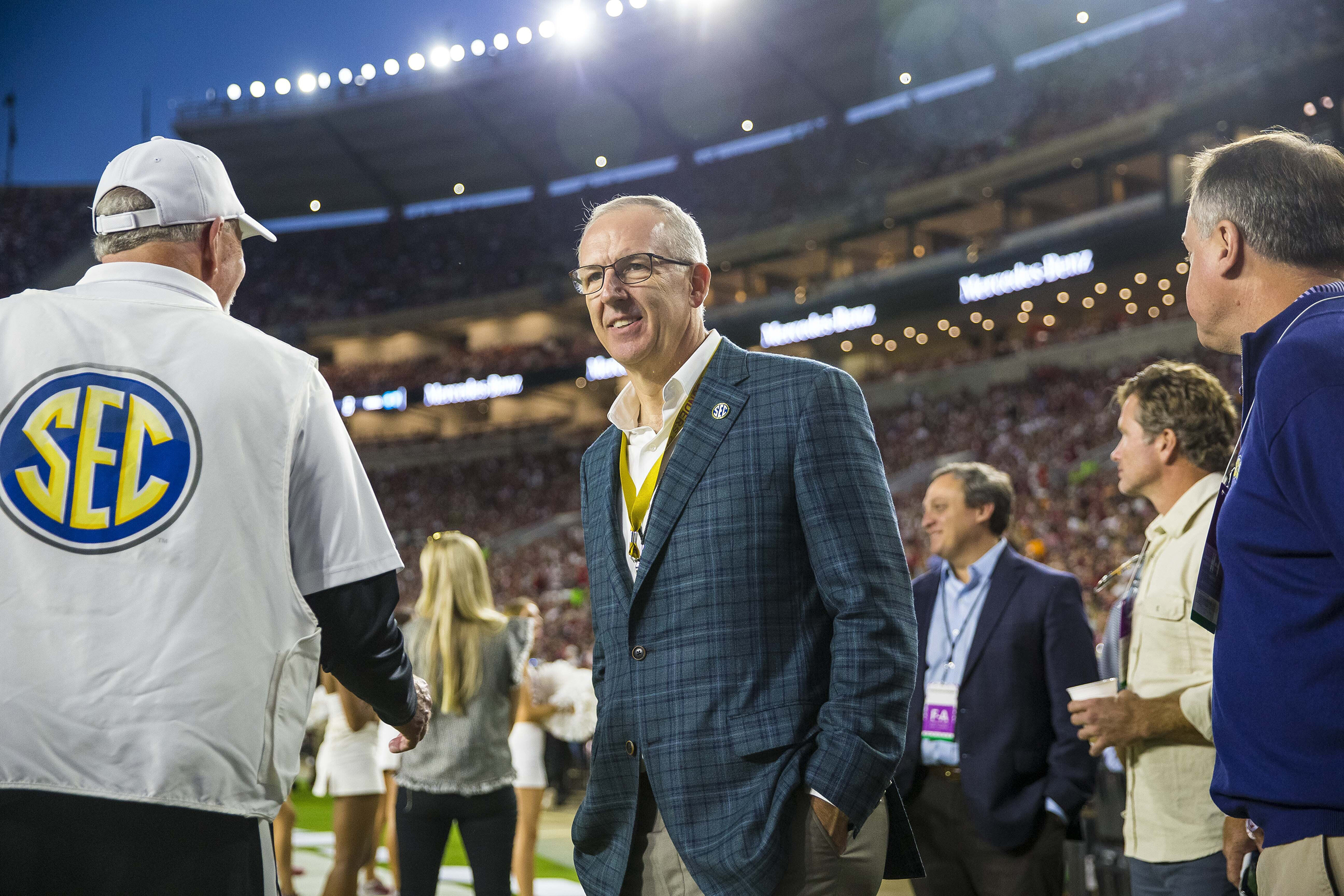Not expanding the College Football Playoff sooner won't make it easier to expand it later.
"In fact, I think it becomes more complicated," Southeastern Conference commissioner Greg Sankey told The Associated Press on Friday.
The CFP is set to remain a four-team bracket through the 2025 season after the administrators who manage the postseason failed to agree on a plan to expand before the current contracts run out.
What started with an enthusiastic unveiling of a plan for a 12-team playoff last summer has come to a halt. The college sports leaders tasked with working out the details are at an impasse.
"Seems like everyone says they're committed to expand the CFP, but it's hard to believe that because we can't expand the CFP," Sun Belt commissioner Keith Gill told AP.
The CFP management committee - the commissioners of the 10 Football Bowl Subdivision conferences and the athletic director of powerful independent Notre Dame - met by video conference earlier this week.
"I'm disappointed we couldn't get something in place," American Athletic Conference commissioner Mike Aresco told AP on Friday. "Time was running out. The disappointment also stems from the fact that I think we will eventually get there, and I think 12-team is still the most likely scenario."
Aresco, who released a letter Monday detailing the obstacles to expansion, said the purpose of the call was to determine if anyone's position had changed. The answer was no.
"So at that point, I guess the implications were clear," he said.
On Thursday, the university presidents who make up the board of managers accepted the commissioners' recommendation to abandon the idea of early implementation and directed them to keep working on a new format for the 2026 season.
"After 2025, there is no playoff," Aresco said.
This process actually started after the 2018 season. With calls for expansion already coming - mostly from the Big Ten and Pac-12 - the board of managers asked the management committee for a plan for the next evolution of the CFP. The hope was it could be implemented a few years early instead of waiting for the current 12-year media rights deal with ESPN to run out.
The SEC's Sankey was part of the four-person subcommittee that produced the 12-team proposal after two years of work. The plan called for the field to be the six highest-ranked conference champions and six at-large teams determined by selection committee rankings, with the top four seeds receiving byes. Four first-round games would be played on the home fields of the higher-ranked teams, with quarterfinals and semifinals hosted by bowl games.
Sankey said the group sifted through more than 60 playoff models.
"We've identified, already, solutions to some of the concerns identified," he noted. "What strikes me as unfortunate is people haven't wanted to act on those as they protect their own interests."
The decision to shelve early expansion came as no surprise at this point.
The commissioners left their last in-person meetings in early January gridlocked, frustrated and unable to produce the unanimous consensus needed to move forward with a 12-team proposal they had been haggling over since June. The presidents did not fully close the door on early expansion after that meeting, but hope for an agreement was clearly fading.
A few days after the meetings in Indianapolis, Atlantic Coast Conference commissioner Jim Phillips took the strongest public stance yet against early expansion, saying a new CFP format should not be a priority with so much uncertainty throughout college sports.
On Friday, the commissioners finally signaled they have given up on on trying to implement expansion for the final two years of the ESPN deal - a failure that will cost the conferences an estimated $450 million in additional revenue.
The road to expansion appeared to be much smoother eight months ago, when the CFP publicly unveiled the 12-team plan. Even with details to be worked out, there was hope an agreement could be reached by the fall and a new format could be in place by the 2024 season.
About a month later, it was revealed the SEC was in talks with Oklahoma and Texas to leave the Big 12 and join the powerhouse league that has produced 12 of the past 17 national champions. Relatively new commissioners in the ACC, Big Ten and Pac-12, already leery of a process that started before they were involved with the CFP, became even more disillusioned after the SEC's expansion plan became public.
Progress has stalled since then, despite more than half a dozen in-person meetings with the commissioners.
Big Ten commissioner Kevin Warren has said he favors automatic bids for the champions of the Power Five leagues, instead of the six best champs regardless of conference. The commissioners of the FBS conferences outside the Power Five - the AAC, Conference USA, Mid-American, Mountain West and Sun Belt - are against that.
The ACC's Phillips continued to push for a smaller expansion to eight, if any at all. Pac-12 commissioner George Kliavkoff said his conference, which has placed a team in just two of eight playoffs, supports any number of formats involving eight or 12 teams. However, Kliavkoff was also asking for the Rose Bowl to retain its traditional New Year's Day time slot in a new format, and most of the others were not on board.
"I share the disappointment felt by many college football fans today," Kliavkoff said in a Twitter post. "I look forward to working collaboratively with other Commissioners to deliver a football playoff format that is more inclusive and balanced."
The majority of the group remained steadfast in support of the initial 12-team proposal crafted by Sankey, Big 12 commissioner Bob Bowlsby, Mountain West commissioner Craig Thompson and Notre Dame athletic director Jack Swarbrick.
"These issues aren't going away," the Sun Belt's Gill said. "We've got to get started and over the next 12 to 18 months have some solutions. I don't know what will have changed between (now and) then."
Sankey's stance is the SEC already made a concession by agreeing to expand in the first place. The SEC has never been left out of the four-team playoff, which began in the 2014 season, and when Georgia beat Alabama in the national championship game last month, it was the second time two SEC teams played for the CFP title.
Still, Sankey has acknowledged a bigger playoff field could boost interest in college football nationally.
And yet now there is no guarantee the SEC will remain supportive of expanding beyond four when it comes to what comes next.
"From our perspective, we've given. We're going to have to go and rethink our position based on how others have approached the conversation that, really, they initiated," Sankey said. "And I don't expect that to get any easier."

